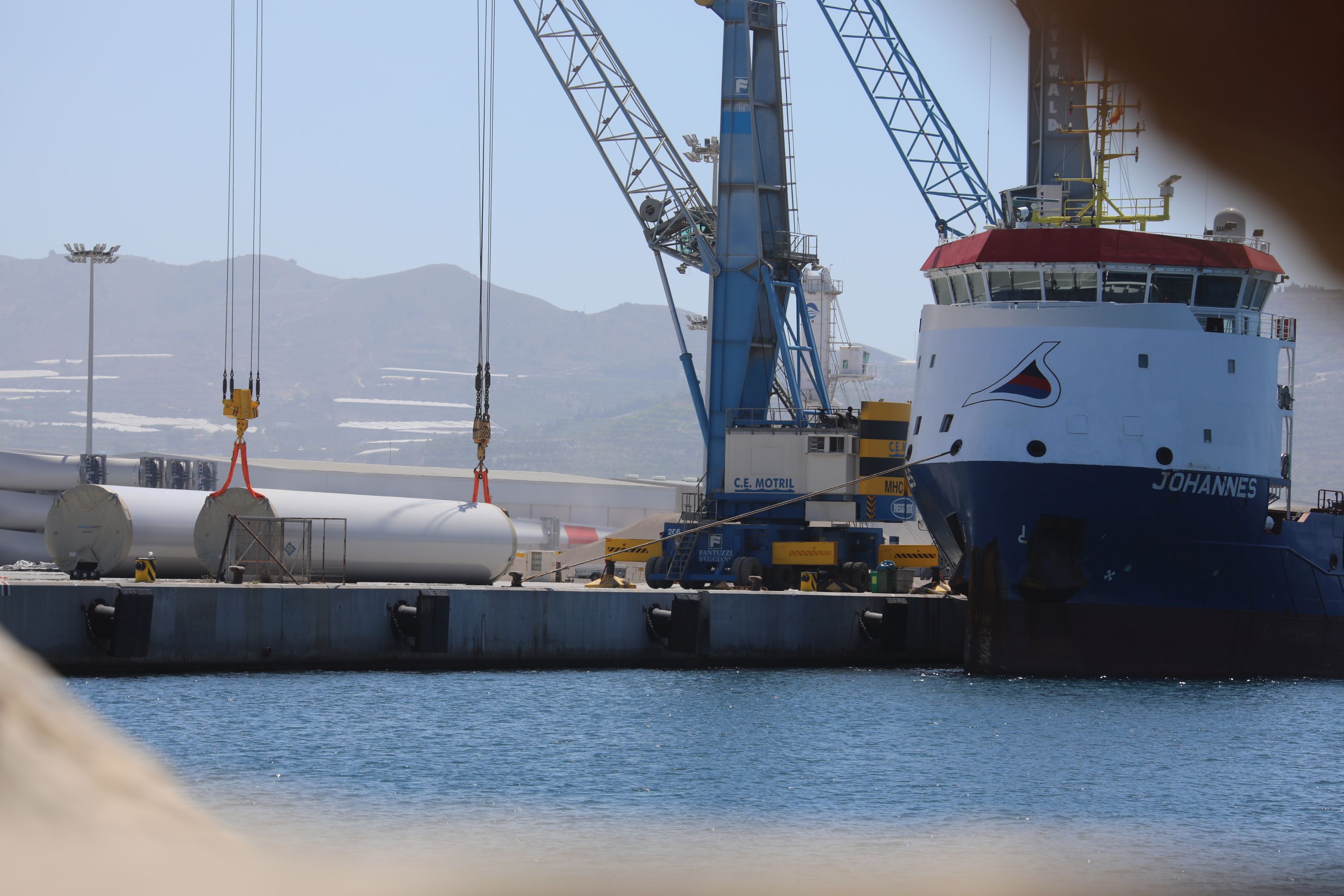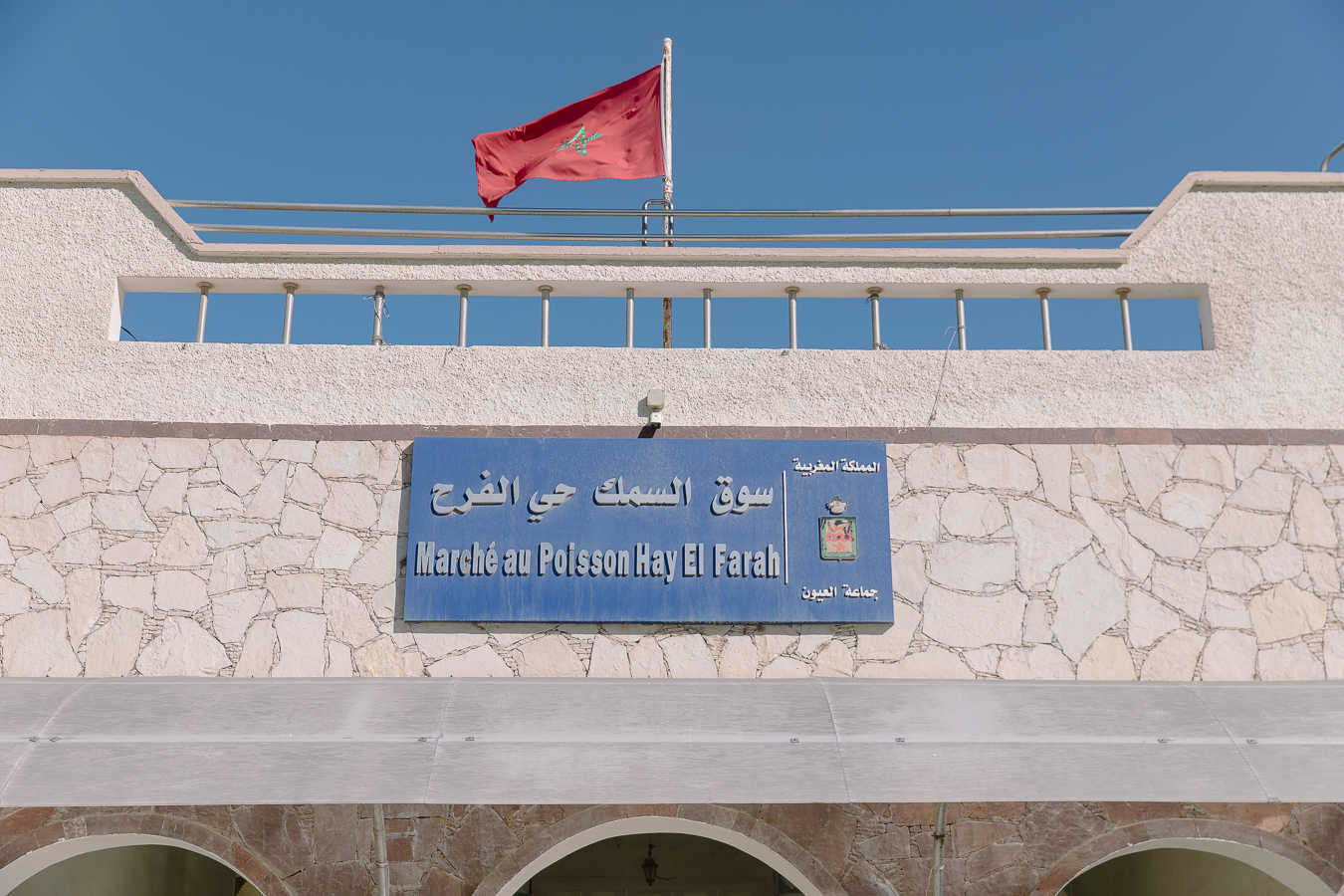
The “on-the-ground” partners of oil company Kosmos Energy in occupied Western Sahara do not base their work on local expertise. Far from it. They are led by directors with a clear pro-Moroccan approach to the conflict. Kosmos Energy is looking for the answers they want to hear - from the wrong people.

Consider the text to the right. It is written on the website of US oil company Kosmos Energy in an effort to explain the considerable efforts the company claims to have done in Western Sahara. Kosmos is about do drill in occupied Western Sahara in partnership the occupying power, Morocco. On its website, Kosmos explains the partnerships they've entered into to make sure that what they do on the ground is right.
Western Sahara Resource Watch has inquired into the background of Kosmos Energy’s partners.
First, the basics: There are two prerequisites to be fulfilled if drilling in Western Sahara is to be anywhere close to legal, according to the United Nations.
A. Firstly, the people of Western Sahara need to consent. That is the easiest point to establish: They don’t. All Saharawi groups have objected to Kosmos Energy’s planned drilling. The Saharawi government in exile has condemned it. Numerous demonstrations have taken place since the plans were first mentioned. The idea that Moroccan governmental institutions are going to seek the Saharawi people's consent – at the same time as Morocco’s entire Western Sahara policy is based on blocking the Saharawi people’s right to self-determination – is rather ironic to many observers. In an interview with Reuters this year, the Moroccan government even dismissed the whole question of wishes and interests. The company and the Moroccan government have not initiated any credible discussions with the Saharawis to inquire whether they want the further exploration to take place or not.
B. Secondly, the Saharawis need to benefit from the oil programmes. In an apparent bid to establish that, Kosmos is partnering with NGOs with a leadership that has a completely unnuanced position vis-à-vis the conflict. First of all, Kosmos has done nothing to ensure that the people of the refugee camps benefit – representing around 50% of the Saharawi people. According to the person that Kosmos commissioned to carry out the Social Impact Assessment, there are no such people as Saharawi refugees. But what about in the territory under Moroccan occupation? In order to establish that, Kosmos has entered into an agreement with the Moroccan government and “NGOs” to find out. But who are the Moroccan partners that are to establish if the people they occupy are benefiting from the Moroccan oil exploration on the land Morocco has invaded?
“Much of our on-the-ground work has focused on stakeholder engagement and social investment, consistent with how we conduct our business everywhere we operate”, Kosmos notes on its website. Morocco enlists three partners that helped them on the ground.
All are rather controversial, and from what is known of them – or at least of their board members – they all represent the Moroccan position to the conflict.
Kosmos has placed the main responsibility of the benefit discussions with the Moroccan government institution CESE (French acronym for Economic, Social and Environmental Council). The agenda of the Moroccan government in the issue of Western Sahara is obvious. Kosmos refers to CESE’s works and a strategy that CESE has produced to develop the “Kingdom’s Southern Provinces”. As far as WSRW knows, representatives of the Saharawis have at no point been consulted in the making of that report, as is in line with the Moroccan approach since the occupation. CESE cannot be considered nuanced and independent. Its main objective in Western Sahara has nothing to do with respecting or defending the rights of the Saharawi people, and it has just as little competence as any other Moroccan institution to negotiate on behalf of the people of the territory.
Two other institutions are mentioned on Kosmos’s website, and at first sight, in name, they appear to be neutral. However, one of them, High Atlas Foundation, is not. The other seem more to be misled, at best.
HIGH ATLAS FOUNDATION
It is hard to distinguish whether the High Atlas Foundation (HAF) is a Moroccan/US charity organization with a political agenda, or a political organization with a humanitarian façade.
Its activities are two-fold. First the foundation carries out training, water projects and the like in the countryside of Morocco. Second, the foundation does hardcore lobbying and positive branding on behalf of the Moroccan government. The always well-informed Maghreb Confidential labels the group as "Morocco’s highly political High Atlas Foundation" or “pro-Moroccan NGO”.
Its Facebook notes that the organization was set up for “the benefit of the Moroccan people”, see also its website. While supporting the Moroccan people is good in itself, the question is how a foundation with such an agenda could meaningfully present the interests and wishes of the people of the territory that Morocco is illegally occupying, upon managing projects in the neighbouring country.
HAF and its president have issued numerous reports and articles in which the Moroccan position on Western Sahara is defended, for instance claiming that it would be useful to “demonstrate to the 400,000 people in Western Sahara that a relationship with the kingdom, which promotes their local and regional objectives for human development, is possible.”
The HAF texts are sometimes so unbalanced that they appear to have been cut-and-pasted from the Moroccan government’s news service Maghreb Arab Press. This fairytale praise, hagiographic in character, to the Moroccan king was given by the president of HAF on 24 July 2014:
"As the head of a Moroccan-American NGO dedicated to the Kingdom's sustainable human development […] I cannot help but feel admiration for its monarch, who travels the country ceaselessly, officiating at the opening of innumerable small projects, who speaks the language of development and displays deep knowledge of its subtleties and synergies."
The HAF Advisory Board consists of many of the most politically biased personalities possible to find, and that are involved in lobbying against the rights of the Saharawi people, both in Morocco and in the US:
Board member André Azoulay, the banker who became the financial advisor of the King of Morocco, is one of the most powerful men of Morocco. It is thanks to Azoulay and his colleagues that the King of Morocco’s wealth has boomed during the last decade. The extreme growth of the royal fortune has made King Mohamed VIth one of the richest monarchs in the world, in only a few years – and that in a period of economic stagnation and decline in Morocco.
In a thesis for a master’s degree titled ‘A People vs. Corporation? Self-determination, Natural Resources and Translational Corporations in Western Sahara’, Raphael Fisera writes regarding Azoulay: “Regarding the exploration deals, the King Solomon-like share of Saharawi waters [allocated] to a US and a French company carries evidently a prevailing political dimension. Some specialists have described this deal as the 'Azoulay Plan' according to the name of the main economic advisor to the Moroccan King, Jewish-Moroccan and French André Azoulay. This Shakespearian character through his close personal relationship with both the current French and Moroccan heads of state allegedly conceived a plan according to which the Saharawi oil would be shared equally between France and the US with the specific goal of gaining a definite recognition of the Moroccan annexation of the territory.”
In addition to Azoulay, another leading proponent of the Moroccan government foreign policy on the HAF advisory board is Aziz Mekouar, the former Moroccan ambassador to the US from 2002 to 2011. It was during his term in the US that Morocco would once and for all object to any referendum for self-determination of the Saharawi people – no matter whom participates in it.
A third personality on the HAF board, Abdelghani Aouifia, is a long term journalist in the Moroccan government news agency and propaganda machinery Maghreb Arabe Press (MAP). He has written extensively on Morocco’s “Southern Provinces”.
On the advisory board one also findso two former US ambassadors to Morocco who are considered to be among Morocco’s closest friends in the US. Particularly Edward Gabriel is renowned for the obstacles he put in place for the referendum process during the years of UN negotiator James Baker. Gabriel is currently on the payroll of the Moroccan government. After retiring as ambassador, Gabriel has worked extensively as a lobbyist paid by the Moroccan government. His lobby firm was paid 3.7 million dollars since 2002 by the Moroccan Kingdom, according to Foreign Policy earlier this year. He has systematically lobbiedto advance the Moroccan government’s position on Western Sahara.
Another former ambassador on the HAF board is Margaret Tutwiler, who served in Rabat from March 2001 to 2003. According to a US investigative journalist, “she was obviously placed there […] to help cut oil deals”. The Oklahoma based energy company Kerr-McGee received its Boujdour licence six months after Tutwiler took office. It is that very same licence that ended up with Kosmos Energy, who is now going to drill in the corresponding area. Tutwiler was present when the Kerr-McGee deal was inked.
The most important source of funds for HAF is none other than the Moroccan government owned phosphate producer OCP, which has been plundering the territory of Western Sahara since 1975. HAF also lists the most important Moroccan lobby and PR institutions vis-à-vis the US on its website as “partners”.
So again, what is the HAF foundation doing with Kosmos Energy in Western Sahara? After all, it purports to be an institution set up to defend the Moroccan people’s interests. Well, according to HAF, Boujdour is not even in Western Sahara – but in Morocco.
A blog post on 6 May 2013, named "HAF has become Part of the Boujdour Community", it is mentioned:
"The High Atlas Foundation’s sun has started to rise in the southern provinces of Morocco particularly in Boujdour. The HAF proved its persistence to reach remote, disadvantaged, and excluded regions; so neither the severe frost of snow in the mountains nor the harsh storms of sand in the desert would be a stumbling rock in front of HAF’s noble goal; which is precisely to make a better change and happier life for the local people of any part of Morocco. This is how the HAF, the Moroccan-US organization for sustainable development, has become finally part of the Boujdour local community and the local community in its turn has become part of the HAF’s organization. This great combination didn’t come easily or between a day and night, but after six months of building relationships with the people and their representatives. May 2, 2013 was a historical day on which the HAF has given birth to its new local branch, this time in Boujdour many miles away to the south of Morocco."
See also Facebook posts below along the same lines.
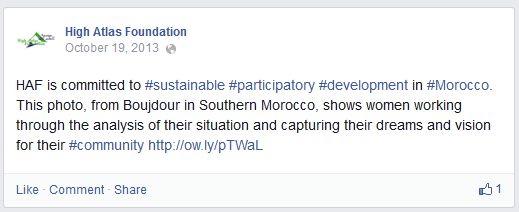
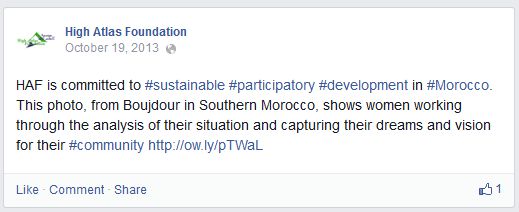
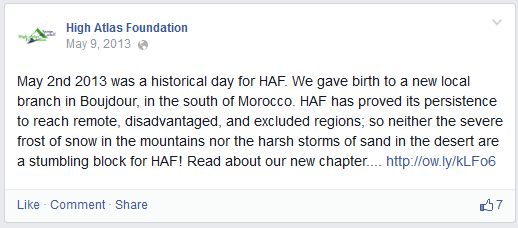
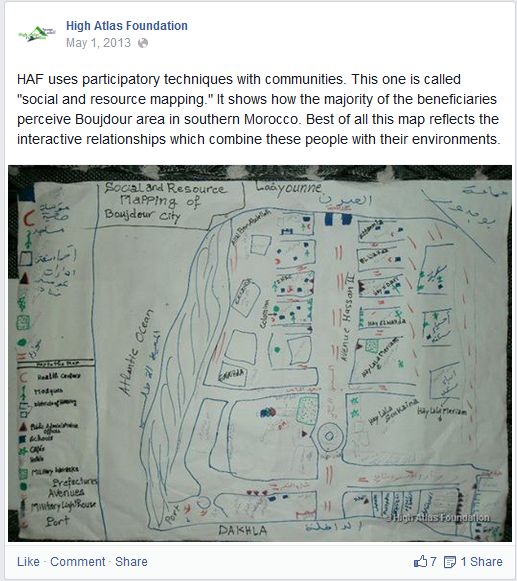
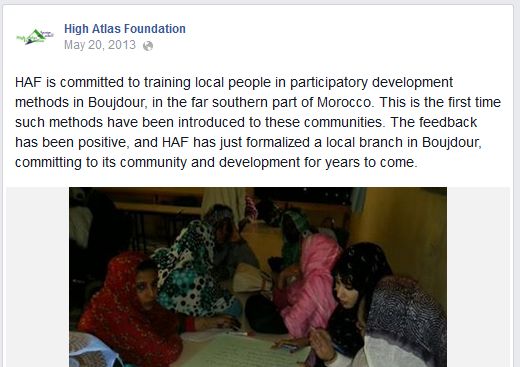
AMIDEAST
AMIDEAST, the other association having worked for Kosmos "on-the-ground" is a US non-profit association working to strengthen the ties between the US and Middle East. The organisation has offices in many Middle East countries, including in Morocco. AMIDEASTS’s board and leadership consist of a broad group of people from all backgrounds – of US and Middle East background. With offices in Morocco – how do they stand on Western Sahara? Little is known about that. Their first steps into Western Sahara was taken as late as in 2011, from what WSRW understands.
From a detailed review, two persons on the board stick out with a particular background in Morocco – they are on Moroccan government payroll.
One is Mostafa Terrab, who is the president and chair of OCP, a company who has been taking part in the exploitation and exportation of phosphates from occupied territory since 1975. OCP’s revenues from the mine in Western Sahara was according to WSRW’s estimates around 330 million USD only last year.
The other is, as it is with High Atlas, the former ambassador Gabriel, paid by the Moroccan government. Evidently, any balanced approach to the question of resource extraction in a Western Sahara under occupation would not be taken by the two.
The question is whether the administration of AMIDEAST then allows the organisation to be used in Morocco’s political game to gain legitimacy over its illegal occupation.
On the website of AMIDEAST, Western Sahara cities are mentioned twice. Both of them refer to training of “Moroccan youth” in Western Sahara: See “Launched in February, the AMIDEAST-OCP Groupe initiative targets disadvantaged Moroccan youth from Rabat, Casablanca, and Laayoune” – published March/April 2011, and “Moroccan Youth Thrive at New Skills Centers”
There are no mention to the fact that these people are settlers moved into the territory in violation of the 1949 Fourth Geneva Convention, and that the people of the territory are someone completely different.
Apart from two places where AMIDEAST mentions supporting “Moroccan youth” in Western Sahara cities, there are no other sign of programmes, history or track record on Western Sahara.
WSRW knows no examples of AMIDEAST or HAF having sought permission from people of the territory whether they should be running programmes in Western Sahara in partnership with Kosmos or in any other capacity. In fact, none of the Saharawi groups that WSRW has been in contact with had ever heard of them.
AMIDEAST, HAF, Kosmos Energy and Morocco are all looking for the wrong answer – systematically asking all the wrong people.
New report: Certified occupation
International certification standards embellish Morocco’s controversial trade with fisheries and agricultural products in occupied Western Sahara, new report documents.
Certification giant SGS points fingers elsewhere
SGS blames everyone else for mistakes on MarinTrust certificates it had issued to Moroccan companies in occupied Western Sahara.
New report: Greenwashing Occupation
Out now: WSRW today publishes a new report outlining the massive - and deeply problematic - renewable energy projects that Morocco is developing in occupied Western Sahara.
GMP+ does not check if “sustainable” fish is legally caught
The world’s largest certification scheme for “safe and sustainable animal feed” does not check whether its certified fish feed companies source from illegal fisheries in occupied Western Sahara, where catches violate the Saharawi people’s right to self-determination.


